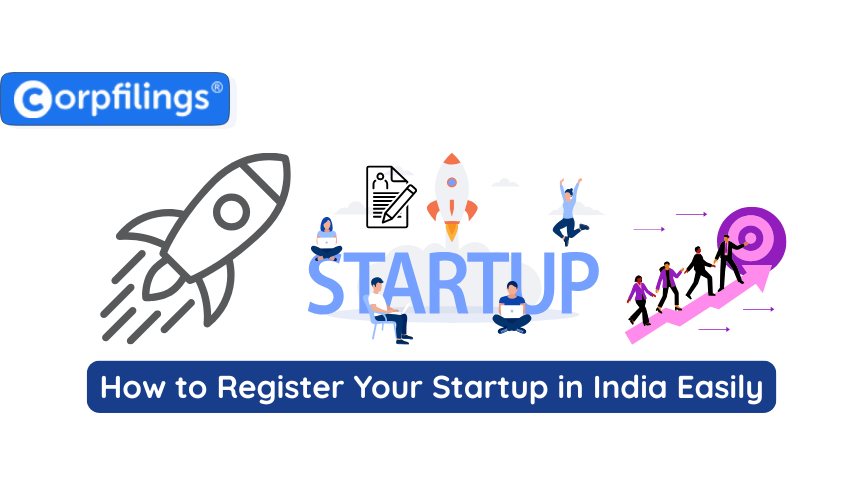How to Register Your Startup in India Easily

Starting a business is an exciting journey, but for many entrepreneurs, the legal and compliance side often feels overwhelming. One of the most common questions new founders have is: how do I register my startup in India? Understanding the process not only ensures compliance but also helps you access the benefits offered under the Startup India scheme.
This guide walks you through everything you need to know about startup registration in India—eligibility, process, documents, and advantages—so you can focus on building your business instead of worrying about red tape.
Why Register Your Startup?
When you formally register your startup, you gain recognition from the Government of India. This recognition brings access to tax benefits, funding opportunities, networking support, and protection of your intellectual property. More importantly, registration establishes your credibility with investors, clients, and partners.
Without registration, your startup may miss out on government schemes and face challenges while raising capital. For early-stage businesses, this could slow down growth and make it harder to compete.
Eligibility Criteria for Startup Registration in India
Not every business qualifies as a startup under the Startup India initiative. To be eligible:
-
The company should be incorporated as a Private Limited Company, Limited Liability Partnership (LLP), or Partnership Firm.
-
The business must be less than 10 years old from the date of incorporation.
-
Annual turnover should not exceed INR 100 crore in any financial year.
-
The startup must be working towards innovation, development, or improvement of products and services.
-
The entity should not be formed by splitting or reconstructing an existing business.
If your business meets these criteria, you can proceed with the registration process.
The Process of Startup Registration in India
Registering your startup may seem complicated, but with the right approach, it becomes manageable. Here’s a step-by-step overview:
Step 1: Incorporate Your Business
The first step is incorporating your business as a Private Limited Company, LLP, or Partnership Firm. This requires filing with the Ministry of Corporate Affairs (MCA) and obtaining the Certificate of Incorporation.
Step 2: Register on Startup India Portal
Once incorporated, you must create a profile on the Startup India portal. This platform is dedicated to providing recognition and resources for startups across India.
Step 3: Upload Required Documents
You will need to submit documents such as:
-
Certificate of Incorporation
-
PAN card of the company
-
Details of directors/partners
-
Proof of business activities and nature of innovation
Step 4: Get DPIIT Recognition
The Department for Promotion of Industry and Internal Trade (DPIIT) provides official recognition. This recognition is crucial for availing tax exemptions and government incentives.
Step 5: Apply for Tax Benefits and Funding
Once your startup is recognized, you can apply for benefits like Section 80-IAC income tax exemption, Angel Tax exemption under Section 56, and access to government funding schemes.
Benefits of Startup Registration
Registering under the Startup India scheme provides several advantages:
-
Tax Exemptions: Eligible startups can enjoy a three-year tax holiday and exemption from Angel Tax.
-
Funding Opportunities: Startups can apply for funds from the Rs. 10,000 crore Fund of Funds managed by SIDBI.
-
Networking and Mentorship: Access to incubation programs, mentorship, and networking with industry experts.
-
IPR Benefits: Startups receive fast-tracking of patent applications and significant cost reductions in intellectual property rights filings.
-
Ease of Compliance: Recognized startups can self-certify compliance under various labor and environmental laws.
Common Challenges Faced by Founders
Many entrepreneurs hesitate to register their startup due to perceived complexity. Some common concerns include:
-
Confusion about eligibility and required documents.
-
Uncertainty regarding which business structure to choose.
-
Lack of clarity on post-registration compliance.
-
Misconceptions about costs and timelines.
The truth is, with professional guidance or reliable resources, these challenges can be overcome easily.
Conclusion
Startup registration in India is more than just a legal formality—it’s a gateway to growth opportunities. From tax benefits to funding and credibility, the advantages outweigh the initial effort required. If you are serious about scaling your business, registering your startup should be one of your first steps.
Taking this step not only strengthens your position in the market but also shows potential investors that you are building a future-ready company.
FAQs
1. Is startup registration mandatory in India?
No, it is not mandatory, but registration provides access to government schemes, tax benefits, and credibility in the market.
2. How long does it take to register a startup in India?
The timeline depends on documentation and approvals but typically takes between 2 to 4 weeks.
3. Can a sole proprietorship be registered as a startup?
No, only Private Limited Companies, LLPs, and Partnership Firms are eligible under the Startup India scheme.
4. What is the cost of startup registration in India?
The cost varies based on professional fees and government charges but generally ranges from INR 10,000 to 25,000.
- Vibnix Blog
- Politics
- News
- Liberia News
- Entertainment
- Technology
- Εκπαίδευση
- Art
- Causes
- Crafts
- Dance
- Drinks
- Film
- Fitness
- Food
- Παιχνίδια
- Gardening
- Health
- Κεντρική Σελίδα
- Literature
- Music
- Networking
- άλλο
- Party
- Religion
- Shopping
- Sports
- Theater
- Wellness



